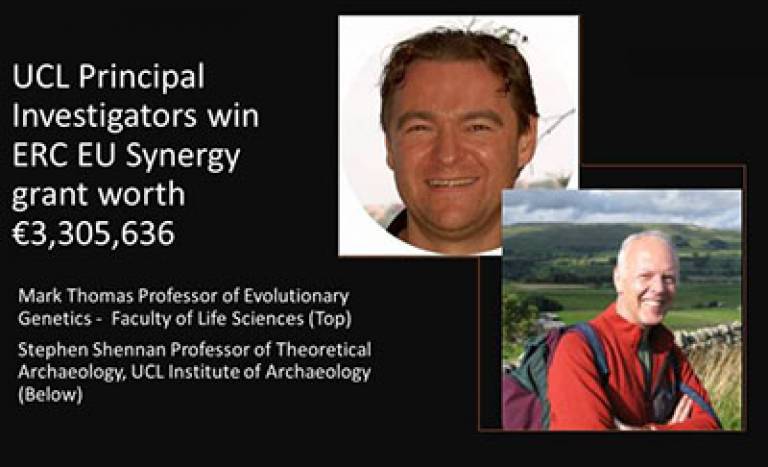UCL Institute of Archaeology researchers contributing to successful ERC Synergy project
10 November 2020
Stephen Shennan is involved in a new project combining prehistoric human genomic, archaeological, environmental, stable isotope and climate data to better understand the processes that shaped our biological and cultural past.

Synergy projects represent the top level of European Research Council funding, with a budget of €10 million over six years, and bring together top researchers from different fields who work collaboratively to create new, innovative research that could not be achieved individually.
Which came first: Climate changes or social and economic changes? How did cultural and genetic changes influence each other? What caused people to migrate? In the project 'From correlations to explanations: towards a new European prehistory (COREX)', which has recently been awarded ERC Synergy funding, geneticists and archaeologists from UCL (led by Mark Thomas from the Department of Genetics Evolution and Environment and Stephen Shennan at the Institute) will join forces with archaeologists from Gothenburg (led by Kristian Kristiansen and Karl Göran Sjögren), and geneticists from Copenhagen (led by Kurt Kjær, Eske Willerslev and Fernando Racimo) to investigate these questions from the time of the first farmers to the Iron Age.
Over the last 10 years ancient DNA data has revolutionised archaeology but has also created new challenges in understanding the relationship between human demographic history and the material culture they leave behind. Using new data and computer simulation techniques, this six-year Synergy project aims to clarify how large-scale processes such as mass migrations can be caused by more local-scale behaviours, and how population-scale processes shape, and are shaped by, patterns of cultural variation.
According to Stephen:
It’s extremely exciting to have this wonderful opportunity to address one of the great challenges in current archaeology, how do the patterns we find in the archaeological record relate to the new findings from ancient DNA and their implications for prehistoric population movements."“
Stephen is the author of the 2018 volume The First Farmers of Europe: An Evolutionary Perspective (Cambridge University Press) which demonstrated how the spread of farming resulted from a population expansion from present-day Turkey while the demographic patterns associated with this spread resulted in population booms and busts, not continuous expansion. He will lead a team of researchers at the Institute on this new Synergy project who will integrate existing and newly collected large-scale archaeological and other data to provide a basis for various modelling techniques.
Following the ERC Synergy 2020 call, 34 successful research groups will receive EUR 350 million in total to address some of the world’s most formidable research problems spanning multiple scientific disciplines. More than 440 proposals were submitted to this call, making it one of the most competitive in ERC history.
 Close
Close

